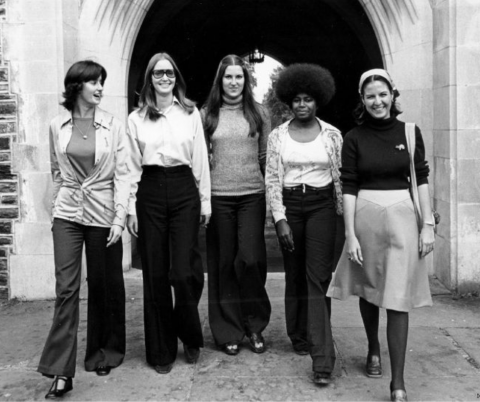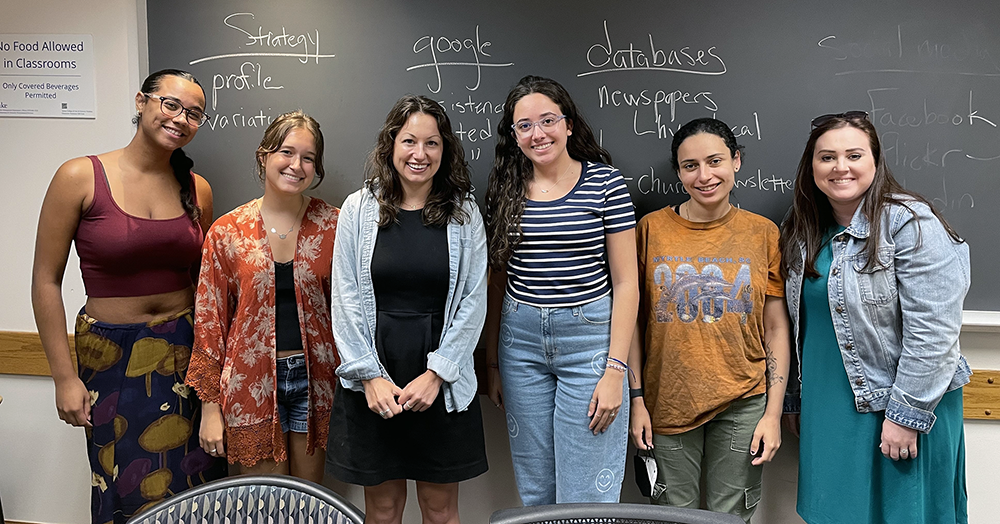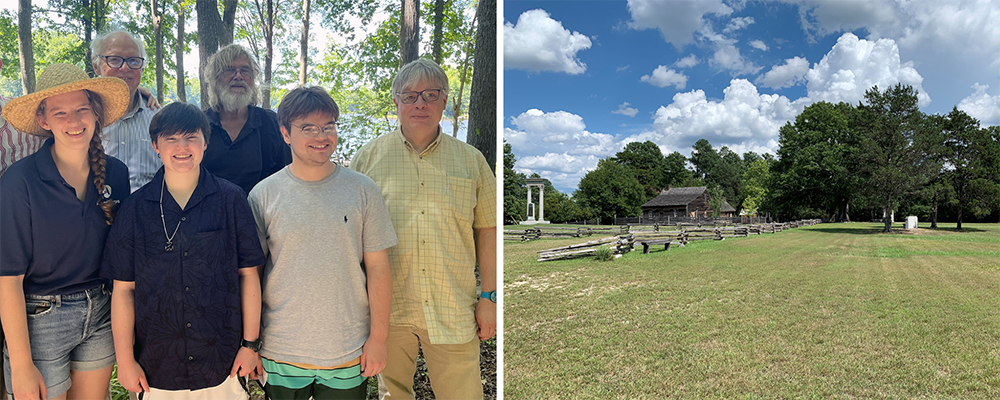
Making Public History
This summer, the inaugural History+ program became a new member of Duke’s “plus” suite of collaborative summer research experiences.
Since Data+ launched in 2015, students of all levels have worked on research projects alongside other teams on campus. Other “plus” programs include Applied Ethics+, Arts+, Climate+, Code+, CS+, I&E+ and Math+.
In History+, four teams of undergraduates were paired with graduate mentors and faculty or professional sponsors. Teams collaborated with their clients to envision, research and ultimately produce deliverables either for direct public consumption or contribution to a larger project ultimately intended for public display.
After eight weeks of working together, History+ participants gathered in East Campus’s Classroom Building to celebrate and share insights from their personal and communal work.
Duke and the Evolution of Higher Education

Conceived as part of the Centennial celebration of Trinity College’s 1924 transformation into a comprehensive research university, this project helped place the evolution of Duke into historical context through interviews with people who have led, or been part of, innovations that have shaped the university and the trajectory of higher education over the past five decades.
Building on the efforts of a Bass Connections team, students engaged with best practices in oral history, conducted and transcribed multiple interviews with retired faculty and staff members, adding to the range of perspectives reflected in the project, and collected relevant photographs. Team members also wrote brief biographies to contextualize the interviews, which, along with interview transcripts and audio, will become part of a public-facing archive.
The team of five students was mentored by graduate student Sydney Marshall and sponsored by Ed Balleisen, vice provost for interdisciplinary studies, and Jenny Wood Crowley, assistant vice provost for undergraduate education.
Gentrification in Durham
In this partnership with the Museum of Durham History, five students created an archive of material from which to draw for the museum’s Spring 2025 exhibit on the history of gentrification and housing inequality in Durham. The team was mentored by graduate student Katlin Risen and sponsored by Michelle Needham, the museum’s director of education programs and exhibits.
Students were also tasked with helping the museum to craft, materially and visually, the story they wanted to tell — a multifaceted narrative touching on race, gender, environmental justice and law that is unique to Durham, but reflective as well of countless cities across the country.
This effort involved combing through many decades of internal and public records of housing, education, religious and political entities and organizations, not to mention newspaper archives, as well as old-fashioned legwork, familiarizing themselves with the city’s layout, past and present, and its distinct districts and communities.
Latinx History and Conservatism

This project was a deep archival dive into conservative social and political movements throughout American history, unearthing its adaptive political attitudes and their evolving expressions toward immigrant and Latino populations. Students also examined how these attitudes, and the policies that accompanied them, changed- either fundamentally or in tone, and how, over many years, these policies came to attract a growing percentage of the non-native and first-generation American populace.
UNC’s Wilson Library and Duke’s Rubenstein Library both contain rich resources on these themes, including collections on racist and anti-racist movements in 20th-century Southern history.
The four students, mentored by Sydney Marshall and sponsored by Cecilia Márquez, Hunt Family Assistant Professor of History, also produced a public-facing pamphlet for the benefit of other students who might be new to archival research and could benefit from some guidelines and tips on process and perspective, as well as an awareness of the need for self-care in the face of potentially traumatic material. The team produced a glossary of data that will aid Márquez’s research and potentially help journalists and other researchers mining similar veins of history.
Bennett Place

The Bennett Place project carried the work of the North Carolina Lives and Legacies initiative into its second year. Best known as the site of the largest surrender of Confederate troops during the Civil War, Bennett Place encapsulates key dimensions of 19th-century southern social history, offering up not just insight into the war, but personal narratives of its own inhabitants, the surrounding population and the Native Americans who first walked the land.
The four students worked with mentor Katlin Risen and sponsors Robert Buerglener, research associate in Information Science + Studies, and Carson Holloway, librarian. Kalei Porter, a graduate student investigating land-use history at Bennett Place, provided additional assistance. The team performed archival research in the North Carolina and Southern Historical collections at UNC’s Wilson Library, spent time deciphering James Bennett’s early-19th-century account book, and identified additional research materials, with an aim toward extending the outward meaning of Bennett Place, excavating and rendering a truer and more inclusive history of this state historical site.
A Successful First Year
The inaugural History+ summer program offered hands-on research experience to fledgling historians, history majors and non-majors alike.
In addition to their project-based work, all team members received training in relevant research techniques and technologies. They also attended a speaker series programmed by recent History Ph.D. Avrati Bhatnagar. Featuring a variety of guests — ranging from Emily Margolis, curator of contemporary spaceflight at the Smithsonian National Air and Space Museum, to Alyssa Smith, research coordinator for Duke’s Malinda Project on the history of race relations at Duke — the series provided students with rich perspectives on public history.
The 18 student participants in History+ met the unique requirements of a historian’s work head on, learning to confront new and emerging interests and overcome impediments to knowledge and discovery. As one participant stated, “I got to tackle a question that a lot of historians may have raised but none have really done the work of answering… I think [my project] establishes the need for further interrogation of a narrative that has gone unchallenged far too long.”
Considering new ideas and reconsidering old patterns of understanding — the work of a lifetime for dedicated historians, and the overriding purpose of History+ and the Department of History at Duke.
Main image: History+ “Gentrification of Durham” team members Ella Patterson, Clarke Campbell, Joe Hammond, Brighton Greathouse and Gargi Sahasrabudhe in downtown Durham
About the author: Craig Kolman is the director of undergraduate studies assistant and program coordinator in the Department of History.
